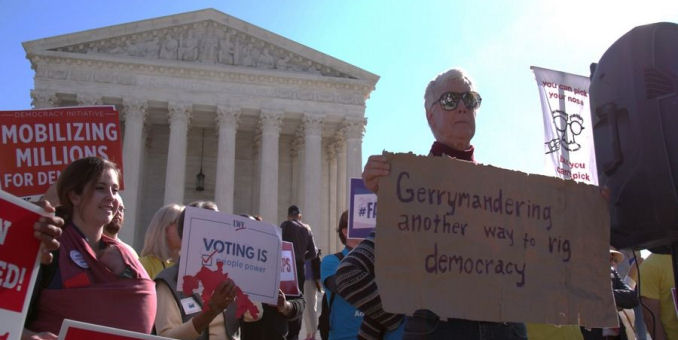We first reviewed Slay The Dragon when it screened at the Tribeca Film Festival last fall. We are republishing the review as part of our Philadelphia Film Festival coverage, where the documentary will screen tomorrow.
For those of you forgetting your junior high civics, the term “gerrymandering” reaches back two centuries to 1812 when Massachusetts Governor Elbridge Gerry redrew voting district lines in order to win more state senate election districts to solidify power for his political party, Democratic-Republican party. With district lines being redrawn once a decade following new population information gathered by the census, politicians from both sides of the aisle have tried to subvert democracy by carefully laying out new district boarders that would minimize the voting power of their opposition with no heed to any pre-existing municipal boundaries. The result is oddly shaped districts that bend and curve in most unnatural ways.
While waves of gerrymandering have come up and been fought back for the years, the worst bout of it has arisen in response to the overwhelming victory of President Barack Obama in the 2008 presidential election. Deeply stung by their losses, the Republican Party embarked on a plan to use 2010 census information to redraw distraict maps in a number of states in such a way that they would be able to claim overwhelming majority of those states’ legislative branches and use those as a way of furthering their political agendas.
And that’s where Slay The Dragon comes in, as directors Chris Durrance and Barak Goodman take a look at the history of gerrymandering, but more importantly, what can be and is being done to combat its corrosive effects.
Make no mistake, though. This is not a dry treatise on political theory. What’s exciting about Slay The Dragon is the film’s narrative spine – the journey of Katie Fahey. A young Michigan voter, she was appalled at what the GOP-controlled redistricting process had done to her state and set out to do something about it. Forming the non-partisan group Voters Not Politicians, Fahey proposed a ballot initiative that would codify into law that Michigan’s redistricting duties be removed from the hands of the politicos who have controlled it and be placed into a non-partisan citizen’s commission.
As Fahey and her team set out to gather the required petition signatures to get their proposal on the ballot, Durrance and Goodman show exactly how gerrymandering has hamstrung the political process and skewed election results. For example, in the 2012 election, although democratic candidates won more votes over all of the state assembly races in Michigan, Republican candidates still won 60% of the actual seats thanks to district lines strategically drawn to minimize the number of potential democratic votes in individual districts. And as the consequences reverberate throughout the state, the film traces a direct line that goes from the gerrymandered Michigan districts in 2010 to the Flint, Michigan water crisis a few years later.
As deadlines loom, political pundits express doubt that Fahey and her group will be able to achieve their goal of getting their initiative on the state ballot. Those entrenched in power obviously have too much to loose if they let slip away the ability to insure their reelection. But what is appalling is that those GOP politicos and operatives, such as Chris Janowski, founder of Project REDMAP (Redistricting Majority Project) and one of the key architects of the post-2010 gerrymandering effort by the Republicans, not only admit to what they are doing, they seem proud of it. At no point does it occur to them that their rigging of the system is a clear admission that they are unable to persuade voters with the strength of their policies and that by winning through cheating is a moral and ethical failing on their part.
As the film continues to follow Fahey and Voters Not Politicians, we watch them defy expectations by getting their initiative on the ballot. But that is just the first of many uphill battles that they face, and even when confronted with a legal challenge that goes all the way to the Supreme Court, they find that they must continue to battle entrenched interests in order to secure functioning democracy for their state.
Slay The Dragon is not just a document of one state’s struggle with gerrymandering and the efforts of its citizens to work towards a more fair electoral process. It is also a wake-up call and a rallying cry to all fifty states and their citizens to not only protect the fairness of their democracy but to fight back when they see an attempt to take that fairness away. And with what is sure to be a contentious presidential election coming in November 2020 followed by a new round of redistricting the following year, it is a call that has never been more timely.




